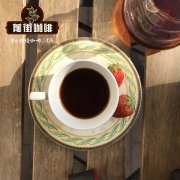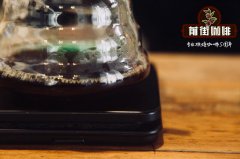Cup tester opened a column criticizing Kopi Luwak like shit coffee _ like shit coffee tastes good?

Professional coffee knowledge exchange more coffee bean information please follow the coffee workshop (Wechat official account cafe_style)
Ever since I came into contact with coffee, about Kopi Luwak, I always think that shit is a gimmick for people who don't know anything about coffee and like to save face. during this Shanghai coffee show, Patrick Tam from Hong Kong also has a lot of the same views on coffee. Patrick Tam, from the perspective of a cup tester, pointed out that Kopi Luwak also has the truth of so-called "luxury coffee" like shit coffee. If you are also a coffee person, please share it with more people. Let's refuse to drink Kopi Luwak like shit coffee, boutique coffee in the wave, do not need this shit!
The truth of ● cat shit abuse of livestock shows ivory hypocrisy and bitter discord.
Recently, it was reported in the press that in response to the appeal of PETA Asia-Pacific, a five-star hotel decided to stop selling civet coffee (commonly known as Kopi Luwak) produced in an inhumane way, and once again drew public attention to animal protection. PETA sent undercover agents to go deep into the farm to film the truth of animal abuse. They even took it out of the farmers that it was almost impossible to produce wild Kopi Luwak in large quantities. As for the so-called "100% wild" paper, it is just a wobble: before being arrested, the civet came from the wild, was kept in an iron cage for three years, was constantly fed and excreted coffee kernels, and after release may die because of malnutrition, psychological trauma, and other problems (zoochosis), unable to adapt to nature. More importantly, as a cup tester, its taste is not qualified.
At present, the consensus of the boutique industry is: "Kopi Luwak is poor quality coffee."
● commercial hype: "the next three sucks" are packaged as "top grade"
After eating coffee fruits, the undigested kernels are fermented and excreted from the body through intestinal fermentation. The coffee beans treated "naturally" in this way were originally collected by farmers from the mud and left to themselves to "enjoy." However, after the deliberate packaging and beautification of the media, it has now become a delicacy. The reason why the public fell into the traps of businessmen is nothing more than a lack of awareness of truly high-quality coffee.
● grass tape tastes rough
The description of the report by local newspapers as "fragrant" and "silent" will only whitewash the legend of the Kopi Luwak. Lilly Kubota, communications manager of the American Fine Coffee Association (SCAA), wrote as early as 2011 to draw three conclusions: 1. The best Kopi Luwak is not as good as the lowest boutique coffee. The most authentic Kopi Luwak comes from caged civets. Most of what consumers buy are fake. In the same year, cup tester Stephen Vicks published a cup test report on the coffee website: "two of the four samples had mildew and phenol (phenol) defects, and the other two cups were reminiscent of grass, potion tape, iodine and raw oysters, with a rough taste." It can be seen that what consumers buy is not quality, but gimmicks (They pay a premium for the story, not quality).
Although the industry generally accepts SCAA's point of view. But there are still people who want to make a fortune out of it. The author knows that someone went to be a cup tester in order to correct the name of Kopi Luwak. However, the peculiar smell in the sample can not escape the cup test.
● is like shit coffee.
At a time of pressure from animal protection groups, a Canadian businessman took inspiration from the intestines of animals and launched an elephant dung coffee (later blackened ivory coffee Black Ivory Coffee). Responsible for the production are 30 elephants from the Asian Elephant Foundation (The Golden Triangle Asian Elephant Foundation) in the Golden Triangle in northern Thailand. In addition to grass and bananas, their daily feed includes an unknown proportion of Arabica coffee fruits.
It is really wonderful to use elephants as contract manufacturing machines. They are large, consume more food and defecate more than civets every day. Manufacturers even focus on the point that "elephants are vegetarian", boasting that their intestines are purer, and that the sugar content of bananas will make coffee beans less bitter and more mellow during the slow fermentation process. The author believes that the addition of coffee fruit to the feed of vegetarian animals is more virtuous than forced meat-eating civets to become vegetarian. However, it is unflattering to use the above argument to support that "elephant dung smells better than cat dung". To produce 1 kilogram of shit-like coffee, 33 kilograms of coffee fruit is needed. Many of them were bitten or lost in the grass. Workers pick up coffee beans from the dunghill, wash them, and remove defects. Such a rare food is naturally expensive: a pound of ripe beans costs $500. Only a few five-star resorts are available in Maldives, Abu Dhabi and Thailand.
The faint smell of grass in ●.
The theory that "intestinal enzymes can reduce the proteins that cause bitterness" cannot stand up to scientific deduction: there are many causes of coffee bitterness, from planting to roasting and brewing. Take a step back and assume that if such a "bitter protein" does exist, it will also be reorganized under the influence of the Maillard reaction effect in a bean oven as high as 200 degrees Celsius, and the taste will change again and again: what is bitter may decompose and sublimate, while what is not bitter before can also become bitter as a result of burning.
As can be seen from the web ads, hotel employees must be trained by bean vendors to improvise with high-end Lido hand grinders and 19th-century Belgian balanced siphon (balancing syphon) before making a $50 cup of dung coffee for guests. Although the former is indeed the top hand grinder on the market today, it is extracted from Belgian cymbals, which can be regarded as antiques, just like taking an abacus to take a math exam: it is more observable, but it is mostly done. Modern coffee extraction pursues quantification, beautiful furnishings, not as crisp as a funnel, a pound and a bottle of water.
● the boss of this company attaches great importance to the evaluation of products on the Internet. When someone mentions Elephant dung Coffee in the coffee discussion area, he always leaves a message under his real name to introduce the benefits of Elephant dung Coffee. Apart from the so-called selling point of "low bitterness, rarity and humanity", it is also stressed that 8% of the profits will be donated to the elephant farms responsible for producing coffee. The beneficiary fund directors also made every effort to cooperate, issuing a statement stressing that the elephant's body will not be affected by caffeine. They explained that caffeine is locked in the nucleus and will not be absorbed by the elephant body. This superfluous move is self-defeating: the industry knows that the whole coffee fruit contains caffeine, from leaves to fruits. Cascara fruit tea contains caffeine, which comes from the flesh of sun-dried coffee. And caffeine has high water solubility and is bound to ooze during digestion. One of the ways to make decaf coffee (Swiss water) is to soak the caffeine in the beans with water. The so-called saying that it is locked in the core highlights the ignorance of businessmen.
The paper says, "like shit coffee has a faint smell of grass."... " Maybe he doesn't know that in the eyes of the cup tester, the taste of grass is a negative adjective for improper baking.
Qianjie coffee: Guangzhou bakery, the store is small but a variety of beans, you can find a variety of unknown beans, but also provide online store services. Https://shop104210103.taobao.com
Important Notice :
前街咖啡 FrontStreet Coffee has moved to new addredd:
FrontStreet Coffee Address: 315,Donghua East Road,GuangZhou
Tel:020 38364473
- Prev

Reveal the black history of Elephant shit coffee _ where is the origin of Elephant shit Coffee? how much is a cup of Elephant Coffee
Professional coffee knowledge exchange more coffee bean information please pay attention to the coffee workshop (Wechat official account cafe_style) recently what is the most popular, when the elephant shit coffee 1880 US dollars per kilogram, not cheaper than Kopi Luwak is good to put aside, but the gimmick a lot of coffee control eager to try, but there are also many netizens shouted to drink coffee to mess with the elephant, why don't you go up
- Next

Why is coffee like shit a hype? Is the story of shit coffee worth the high price?
Professional coffee knowledge exchange more coffee bean information Please follow the coffee workshop (Wechat official account cafe_style) said X shit coffee, can not help but think of such a joke: do you have time for a brief history? I don't pick up shit when I have time. Kopi Luwak is OK, now not only many people pay attention, but also the popularity has gradually improved, and the situation of using Kopi Luwak as a gift has
Related
- Does Rose Summer choose Blue, Green or Red? Detailed explanation of Rose Summer Coffee plots and Classification in Panamanian Jade Manor
- What is the difference between the origin, producing area, processing plant, cooperative and manor of coffee beans?
- How fine does the espresso powder fit? how to grind the espresso?
- Sca coffee roasting degree color card coffee roasting degree 8 roasting color values what do you mean?
- The practice of lattes: how to make lattes at home
- Introduction to Indonesian Fine Coffee beans-- Java Coffee producing area of Indonesian Arabica Coffee
- How much will the flavor of light and medium roasted rose summer be expressed? What baking level is rose summer suitable for?
- Introduction to the characteristics of washing, sun-drying or wet-planing coffee commonly used in Mantenin, Indonesia
- Price characteristics of Arabica Coffee Bean Starbucks introduction to Manning Coffee Bean Taste producing area Variety Manor
- What is the authentic Yega flavor? What are the flavor characteristics of the really excellent Yejasuffi coffee beans?

